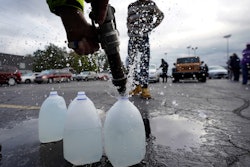
The Association of Equipment Manufacturers (AEM) hosted a briefing to discuss the state of the industry as the economy still feels the effects of the coronavirus pandemic and as the crisis in Ukraine introduces other issues.
According to the AEM Economic Impact Report from 2020, the equipment manufacturing industry contributes $288 billion each year to the U.S. economy and supports 2.8 million jobs. It also generates $791 billion each year in total equipment sales and output.
While the speakers agreed that the industry was starting to emerge from the perils caused by the pandemic, all concurred that to move further, bipartisan policies that support development and investment in infrastructure, trade and workforce needed to be a priority.
"We need federal and state to work together and we would put our names at the table to support and work with federal and state governments to make some of these initiatives happen," President of AEM Megan Tanel said.
AEM Vice-Chair and Chairman and CEO of Komatsu America Corporation Rod Schrader represented the construction angle and said machine utilization is improving, customer backlogs are at high levels and investment is continuing in housing.
Schrader predicts the most active construction will involve housing, infrastructure and nonresidential such as hospitals and schools. However, headwinds he mentioned include rising costs, tight labor availability, stressed supply chains and global unrest.
As far as supply chain concerns go, Schrader thinks it has stabilized.
"We've taken actions using a variety of ports and transportation modes," Schrader said. "We've tried to bring on additional suppliers to minimize the risk profile. I believe it will get better in 2022 but not back to normal.
Bob Crain, AEM Chair and Senior Vice President, Customer Experience at AGCO Corporation, expects higher retail industry demand in 2022.
To improve the agriculture industry, Crain said, "We urge Congress to support free and fair trade practices, which allows farmers and ranchers to sell goods into markets."
Both emphasized the importance of supporting a pipeline of skilled workers who can meet the economy's needs. According to Crain, areas needing attention are developing tech and community colleges, providing focused and effective programs and expansion of the Workforce Innovation and Opportunity Act.
"We need policies that create more opportunities for equipment manufacturers," Senior Vice President, Government and Industry of AEM Kip Eideberg said. "Creating more jobs is important, but without a pipeline of workers, we can't take advantage of economic growth."
Just as COVID-19 appears to calm, the Russian invasion of Ukraine poses new problems. One of those is access to energy. With sanctions piling on Russia, the United States may have to rely less on foreign energy and focus more on energy produced in North America.
"Access to any energy is fundamental and essential to continued growth of industry," Tanel said. "A clean and healthy environment is important and we encourage investments and innovation in the energy sector. Biden said steps can be taken to bolster energy that don't require action from Congress, but AEM would be supportive of congressional acts."
Lastly, the speakers discussed the impact of the infrastructure bill on businesses. In November, the bill was signed into law and assigns more than $1 trillion for broadband utilities, transportation, roads and railways.
Tanel said more than 30 policy recommendations from AEM’s “Rebuild With Purpose” infrastructure report were part of the bill. More may be picked up during the implementation process.
"One thing the last two years have made clear is the critical importance of our food supply and the rural communities that overwhelmingly supported investment in these communities," Crain said. "It's imperative just to secure a robust food supply and keep our economy and equipment manufacturers strong. Many of our industries rely on a strong farm economy."
Schrader described the bill’s impact in 2022 as "not so great" and added a more significant effect will be in 2023 and 2024.






















